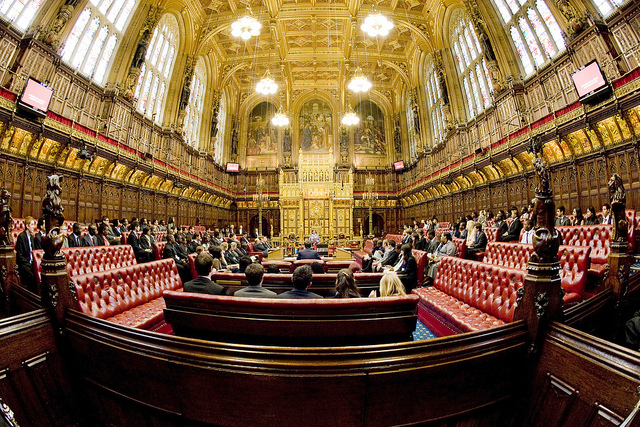The Government has been defeated 10 times in the House of Lords since the election: could this be the new parliamentary reality?
At the 2015 General Election in May, the Conservative Party won a majority in the House of Commons. However, they are far from having one in the House of Lords, which has a very different composition. Here, Hannah White considers the significance of recent defeats in the House of Lords at the start of the new parliament for how the government goes about its parliamentary business.

Credit: UK Parliament, CC BY NC 2.0
In the aftermath of the general election, questions were raised about how the composition of the House of Lords would affect the ability of the new Conservative Government to get its business through Parliament. Even though no contentious legislation has yet reached the final crunch point of legislative ping-pong between the two Houses, the House of Lords has already defeated the government ten times since the election. This seems to vindicate those who predicted that the make-up of the Lords would affect government business in this parliament.
The present tally of peers in the House of Lords is 228 Conservative peers, 212 Labour, 101 Liberal Democrat, 178 crossbenchers, 26 bishops and 38 from other parties or non-affiliated. The Conservative party is far from having a majority and the Liberal Democrats carry much greater weight now in the Lords than in the Commons.
Following the election, the Liberal Democrat Leader in the Lords, Lord Wallace, argued that the convention which constrains the Lords from voting down the governing party’s manifesto promises (the Salisbury convention – established following Labour’s landslide victory in 1945, when the party had just 16 peers) was out of date . He suggested that Liberal Democrat peers would not feel bound by it.
Drawing on the helpful record kept by the UCL Constitution Unit, we can see that the ten government defeats in as many sitting weeks at the start of this session represent a rise in comparison to the last parliament. The last parliament saw a total of 99 government defeats in the Lords –from 48 in the extra-long 2010-12 session to only 11 in 2014-15. If the current rate of defeats continues, then the government could expect to lose 30-40 votes in the Lords each session – that is 150-200 by the parliament’s end in 2020.
The defeats in the new parliament don’t relate simply to a single piece of contentious legislation. Although six of the ten have been on aspects of the Cities and Devolution Bill, the government has also been defeated on:
- two pieces of legislation: the Psychoactive Substances Bill and the Charities (Protection and Social Investment) Bill;
- a set of regulations: the Universal Credit (Waiting Days) (Amendment) Regulations 2015; and
- a motion to establish a joint committee with the House of Commons on proposed changes to Standing Orders relating to English Votes for English Laws (EVEL) – although this remains highly unlikely to happen.
In every case so far it has been the combined forces of Labour and Liberal Democrat peers that have led to these defeats. The only votes that mobilised significant numbers of crossbenchers against the government were those on charity asset disposal and the EVEL committee (with 41 and 75 voting against the government respectively). The margin by which the government has lost these votes has ranged from just 11 votes (on the Universal Credit regulations) to 181 (on the EVEL committee).
In recent comments the Prime Minister confirmed his intention to appoint a large number of new Conservative peers over the course of the new parliament. In discussing his plans he argued that ‘It is important the House of Lords in some way reflects the situation in the House of Commons’. Professor Meg Russell of the UCL Constitution Unit has suggested that these comments appear to invoke a convention that does not exist – that of bringing Lords membership into line with Commons seats – and warned against the continuous expansion of the Lords that would imply.
Although appointing new Conservative peers could help the government avoid future defeats, in practice other parties will get to appoint new peers at the same time which will balance out the effect to some extent. And the main parties already all have a significant rump of peers who rarely participate in votes, who already have the potential to swing outcomes one way or the other should they decide to turn up.
Combined with the mishaps that have taken place on government business in the Commons – notably the adjustment and withdrawal of business on EVEL and fox-hunting respectively – the recent defeats demonstrate the significance of changes in Parliament for the ability of the government to get its business through.
A core of rebellious MPs in the Commons seem increasingly aware of their ability to join with various coalitions of peers to defeat government business across both Houses. It has been suggested that for these members, a narrow majority is distinctly preferable in enabling them to exert influence, to the wider margin allowed by the Coalition. By extension, a strong form of EVEL could potentially diminish this influence and might therefore not be popular amongst this group.
Although we have yet to see whether the Lords will stick to their guns in the final stages of the legislative process, all this represents a significant challenge for the whips. It demonstrates the importance for the government and the civil service of thinking early and carefully about the handling of government business in both Houses – and of appreciating that government plans could well be scuppered if sufficient attention is not paid to the new parliamentary reality.
—
This post originally appeared on the Institute for Government blog and is reposted with the permission of the author. It represents the views of the author, and not those of Democratic Audit or the LSE. Please read our comments policy before posting.
—
 Hannah White is Westminster Fellow at the Institute for Government. More information about her can be found on the IFG’s staff page.
Hannah White is Westminster Fellow at the Institute for Government. More information about her can be found on the IFG’s staff page.





 Democratic Audit's core funding is provided by the Joseph Rowntree Charitable Trust. Additional funding is provided by the London School of Economics.
Democratic Audit's core funding is provided by the Joseph Rowntree Charitable Trust. Additional funding is provided by the London School of Economics.
Government has suffered 10 defeats in the Lords since the election: could this be the new parliamentary reality? https://t.co/xjYs9prqa9
[…] “Quantitive easing to pay for infrastructure now the economy is growing is really bad economics,” she said in Manchester. BrickFair Virginia 2015 complete guided tour – LEGO convention. Meet the Dam Busters. Terrahawks – Steve Begg. British musician and composer John Baker adjusts an audio sweep… Nieuwsfoto's. The Secret Societies That Start & Stop Wars, Manipulate Stock Markets & Censor the News (2001) Grand Designs – East Devon – 2013. The Government has been defeated 10 times in the House of Lords since the election: could this be th…? […]
RT @PJDunleavy: The Government has lost 10 times in the House of Lords since the election. Is this the new parliamentary reality? https://t.…
Government has been defeated 10 times in the Lords since the election: could this be the new parliamentary reality? https://t.co/vCLaG7SDwd
The Government has lost 10 times in the House of Lords since the election: is this the new parliamentary reality? https://t.co/894ELn0KKY
The Government has been defeated 10 times in the House of Lords since the election: could this be the new parliame… https://t.co/8dzUVSt4FH
#CompGov MT @LSEPubAffairs: New UK Gov has been defeated 10 times in Lords. The new parliamentary reality? https://t.co/pOz8mLXT9B
The Government has been defeated 10 times in the House of Lords since the election: could this be the new parl… https://t.co/pLnngXYcMl
The Government has been defeated 10 times in the House of Lords since the election: could… https://t.co/UDOgjPdJ6A https://t.co/xxdPk6yBxf